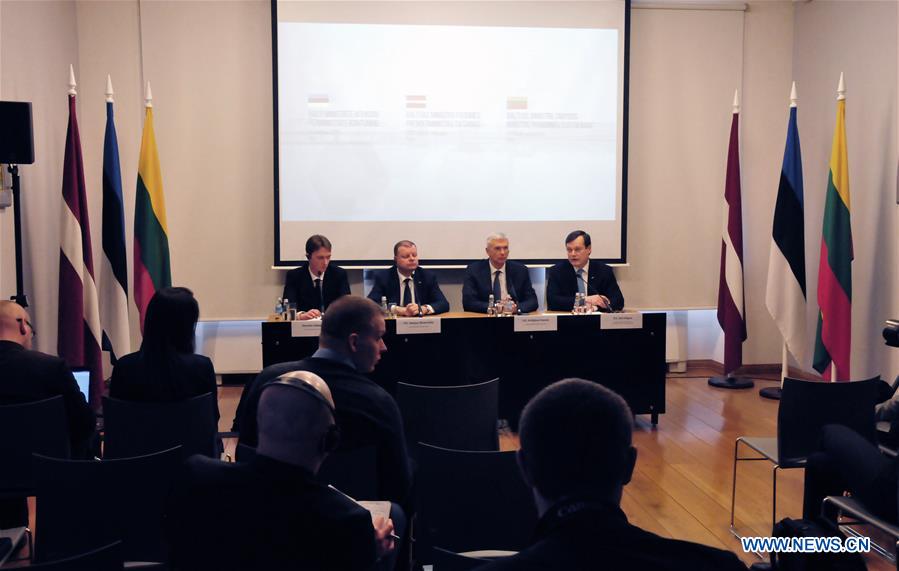
Lithuanian Prime Minister Saulius Skvernelis (2nd L), Latvian Prime Minister Krisjanis Karins (2nd R) and Estonian Ambassador to Latvia Arti Hilpus (1st R) attend a press conference in Riga, Latvia, Feb. 4, 2019. Regional projects, the European Union's (EU) next budget and the UK's withdrawal from the EU were the main topics on the agenda of the Baltic Council of Ministers meeting, which the Latvian capital city Riga hosted on Monday. (Xinhua/Janis)
RIGA, Feb. 4 (Xinhua) -- Regional projects, the European Union's (EU) next budget and the UK's withdrawal from the EU were the main topics on the agenda of the Baltic Council of Ministers meeting, which the Latvian capital city Riga hosted on Monday.
Although the top-level meeting was supposed to bring together all three Baltic heads of government, Estonian Prime Minister Juri Rattas was unable to attend as adverse weather conditions prevented his aircraft from landing at the Riga Airport. Estonian Ambassador to Latvia Arti Hilpus stood in for him at the meeting.
Speaking to the press after the three-way talks at the Art Museum Riga Bourse, Latvian Prime Minister Krisjanis Karins stressed the unity of Latvia, Lithuania and Estonia on matters concerning geopolitics and security, the EU budget after 2020, transatlantic ties and the UK's forthcoming exit from the EU, among others.
"After the meeting I have concluded that Baltic unity is not only alive but also as close as it has ever been," Karins said.
Lithuanian Prime Minister Saulius Skvernelis agreed, saying that in negotiations on the EU's budget, for instance, all three Baltic states are united in their demand to stop discriminatory treatment of farmers in some of the bloc's new member states and to provide adequate cohesion funding also in the EU's next budget.
The funding provided by the EU as part of its Cohesion Policy is especially important for large regional projects as Rail Baltica European-gauge railway, which the three Baltic states are going to build to connect their railway networks with Western Europe, as well as the synchronization of the Baltic power grids with the rest of Europe, Estonian Ambassador Hilpus pointed out.
He also suggested coordinating the Baltic states' relations with the United States and stepping up security and defense cooperation.
The Baltic leaders also voiced skepticism about reopening the EU-UK talks on the Brexit agreement.
The prime ministers denied rumors that UK representatives had asked the Baltic states' assistance to persuade the EU to continue negotiations with the UK in a bid to achieve a better deal and avert a no-deal Brexit.
Latvian Prime Minister Karins said that the UK had not approached Latvia on this issue and that he did not think a new agreement could be achieved on Brexit, given the short period of time remaining until the UK's departure from the bloc.
"There will be no new talks. It is necessary to implement those decisions that have been taken," said Lithuanian Prime Minister Skvernelis.
Commenting on the progress on the Rail Baltica project, which featured high on the meeting's agenda, the Baltic leaders welcomed Finland's decision to join the project.
Noting that funding is one of the project's challenges, Karins said that Finland's participation would make it easier to secure the financing necessary for the project in the EU's multiannual budget. "With Finland joining the project, we will have one more voice interested in defending this project," the Latvian premier said.
The Lithuanian prime minister added that Finland's involvement might also increase Poland's interest in the regional railway project.











